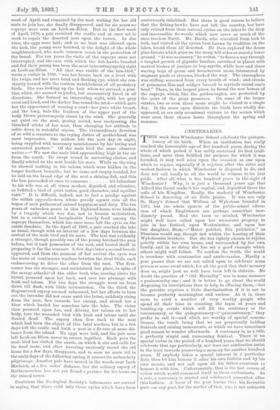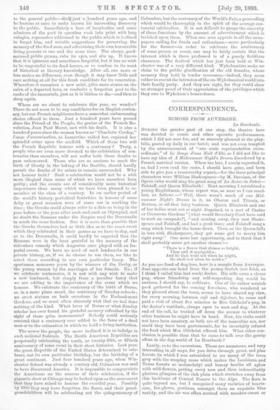CENTENARIES. T HIS week does Winchester School celebrate the quingen- tenary
of its birth. When an institution has really reached the honourable age of five hundred years, during the whole of which period it has nobly sustained its first tradi- tions, and more than fulfilled the purpose for which it was founded, it may well seize upon the occasion as one upon which to rejoice, especially if it rejoices after the sober and modest fashion in which Winchester is disposed to do, and does not call loudly to all the world to witness to its just pride. After all, what is five hundred years in the sight of Winchester P Why, it is just a thousand years ago that Alfred the Great made it his capital, and deposited there the rolls of his Kingdom. Really, the modesty of Winchester School is deserving of no little praise. It was not only St. Mary's School that William of Wykeham founded in 1393, but the whole system of the public-school educa- tion of which Englishmen are perhaps somewhat inor- dinately proud. Had she been so minded, Winchester might well have called upon her numerous progeny to join in her festival, upon Westminster, and upon her fair daughter, Eton,—" Mater pulchra, filia pulchrior," as Etonians would say, though not within the hearing of their Wykehamist brothers. But she has rightly chosen to rejoice quietly within her own house, and surrounded by her own family, and in so doing she has set a good example which others might well follow. To confess the truth, the world is overdone with centenaries and anniversaries. Hardly a year passes that we are not called upon to celebrate some person or some event which, for all the good that their memory does us, might just as well have been left in oblivion. No doubt the practice of " Old Mortality" was in some measure a praiseworthy one ; and it is better to go about the world deepening its inscriptions than to help in effacing them,—but the practice requires a little discrimination if it is not to become perfectly meaningless and useless. As it is, there seem to exist a number of very worthy people who spend all their time in counting the lapse of years and hunting-up events which will fill the centenary or the tercentenary, or the quingentenary—" quincentenary," they prefer to call it—and which are worthy of special remem- brance, the result being that we are perpetually holding festivals and raising monuments, at which we have sometimes good reason to wonder afterwards. A centenary is, as a rule, a perfectly stupid and unmeaning festival. There is no special virtue in the period of a hundred years that we should celebrate that ago particularly, nor does our celebration assist in the least towards preserving a memory for another hundred years. If anybody takes a special interest in a particular date, then let him honour it after his own fashion and by his own means, and not call upon all his fellow-creatures to honour it with him. Unfortunately, that is the last course of action which would commend itself to these enthusiasts. As a rule, a centenary is started and celebrated somewhat after this fashion. A lover of the past learns that his favourite poet—or any poet, for the matter of that, who is not unknown to the general public—died] just 'a :hundred years ago, and he hastens at once to make known his interesting discovery to the public. Immediately a host of busybodies and some admirers of the poet in question rush into print with long eulogies, reproaches addressed to the public which is inclined to forget him, and notable suggestions for preserving the memory of the dead man, and advertising their own honourable living persons at one and the same time. The sleepy, good- natured public groans, rubs its eyes, and sits up. It knows that it is ignorant and sometimes forgetful, but it has no wish to be ungrateful to its dead heroes, or to confess to its want of historical or literary knowledge, After all, one more or less makes no difference, even though it may know little and care nothing at all for this fresh candidate for its veneration. Wherefore it canonises a new saint, piles more stones on the cairn of a departed hero, or readmits a forgotten poet to the ranks of the immortals, just as it is bidden to do,—and then to sleep again.
Whom are we about to celebrate this year, we wonder P There do not seem to be any candidates for an English centen- ary, but our French neighbours have a somewhat embarrassing choice offered to them. Just a hundred years have passed since the Friend of the People, the genius of the French Re- volution, Jean Paul Marat, met with his death. It is also a hundred years since the woman known as " Charlotte Corday," range d'assassination, as Lamartine called her, expiated her splendid crime upon the scaffold. Which of these two will the French Republic honour with a centenary P Truly, a people who are even more devoted to the celebration of cen- tenaries than ourselves, will not suffer both these deaths to pass unbonoured. Those who are so anxious to mark the birth of liberty in the taking of the Bastille, should hardly permit the deaths of its saints to remain unrecorded. Why not honour both P Such a celebration would not be a whit more illogical than some of which we have ourselves been guilty ; and the events are of considerably more historical importance than many which we have been pleased to re- member at the close of a century. In an earlier period of the world's history, periodical festivities in honour of some deity or great occasion were of some use in marking the time ; the Greeks could always refer to a date as being in the year before or the year after such-and-such an Olympiad, and no doubt the Romans under the Empire used the Decennalia in much the same fashion. But it is more than possible that the Greeks themselves had as little idea as to the exact event which they celebrated in their games as we have to-day, and as to the Decennalia, it could hardly be expected that the Romans were in the least grateful to the memory of the ridiculous comedy which Augustus once played with an Im- perial crown. We have no need of such landmarks in our private history, or, if we do choose to use them, we like to select them according to our own particular fancy. The sportsman measures years by the winners of the Derby, or the young woman by the marriages of her friends. No ; if we celebrate centenaries, it is not with any wish to make a new landmark, but simply from a peculiar fancy that we are adding to the importance of the event which we honour. We celebrate the centenary of the birth of Burns, or, in a more pious mood, the centenary of Sunday-schools ; we erect statues on both occasions in the Embankment Gardens, and we must often sincerely wish that we had done nothing of the kind. What lover of Burns or what Sunday scholar has ever found his grateful memory refreshed by the sight of those grim monuments P Nobody could seriously contend that a centenary ever added to the fame of a dead man or to the estimation in which we hold a living institution.
The newer the people, the more inclined it is to indulge in such national festivals. The South American Republics are perpetually celebrating the tenth, or twenty-fifth, or fiftieth anniversary of some event in their short histories. Last year, the great Republic of the 'United States determined to cele- brate, not its own particular birthday, but the birthday of a great continent. Jast four hundred years ago, when Win- chester School was already a century old, Columbus was said to have discovered America. It is impossible to congratulate the Americans on the success of their celebration, if the gigantic show at Chicago may be looked upon as the monument that they have raised to honour the eventful year. Possibly by 1993 they may have forgotten the fiasco, and their great- grandchildren will be celebrating not the quingentenary of Columbus, but the centenary of the World's Fair, a proceeding- which would be thoroughly in the spirit of the average cen- tennial celebration. It is not difficult to gauge the sincerity of these functions by the amount of advertisement which is lavished upon them. When one sees appeals in all the news- papers calling for funds and enthusiasm—more particularly for the former—in order to celebrate the anniversary of some person or event, one may be fairly certain that the interest which is there professed is of a purely fictitious- character. The festival which has just been held at Win- chester was of a very different kind. Wykehamists make no claim to the public glorification of the old founder, whose memory they hold in tender reverence,—indeed, they seem rather to resent the intrusion of the un-Wykehamical world into• their family party. And they are right, for they could show no stronger proof of their appreciation of the privileges which, they owe to Wykeham's benevolence.



































 Previous page
Previous page